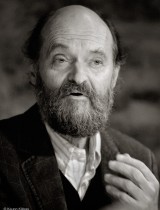Archives
Arvo Pärt //
1935 -

Estonian composer Arvo Pärt studied at the Tallinn Conservatory, graduating in 1963. While a student, he found work as a recording engineer with Estonian radio as well as composing for film and theatre. In 1962, he won joint first prize at the All-Union Young Composers’ Competition in Moscow with his children’s cantata Meie aed (Our Garden). At this time in the Soviet Union, very few scores and textbooks covering serial composition had made their way into the country and it was these books which Pärt was studying. His first serial composition, Nekrolog, was not well received, but Pärt continued to use serial compositional techniques throughout the 1960’s. Credo (1968) caused a scandal as many critics saw it as an avowal of Christianity.
Following this, Pärt again began composing in a tonal language in a style that he calls “tintinnabuli” with the first composition in this new style being a short piano solo, Für Alina. Cantus in memoriam Benjamin Britten, Fratres, Summa, and Tabula Rasa were all pieces which Pärt used to lay a foundation for his new style and establish for him an international reputation, however his career as a composer within the Soviet Union was continually frustrating as he was not accepted by the Soviet authorities, nor the academic establishment. Pärt’s later career has featured many pieces for chorus or small vocal ensemble with texts in Latin, German, Slavonic, Spanish, Italian and English.
Following this, Pärt again began composing in a tonal language in a style that he calls “tintinnabuli” with the first composition in this new style being a short piano solo, Für Alina. Cantus in memoriam Benjamin Britten, Fratres, Summa, and Tabula Rasa were all pieces which Pärt used to lay a foundation for his new style and establish for him an international reputation, however his career as a composer within the Soviet Union was continually frustrating as he was not accepted by the Soviet authorities, nor the academic establishment. Pärt’s later career has featured many pieces for chorus or small vocal ensemble with texts in Latin, German, Slavonic, Spanish, Italian and English.
|
Wednesday, July 22, 2015: 7:00 pm Recital
|



